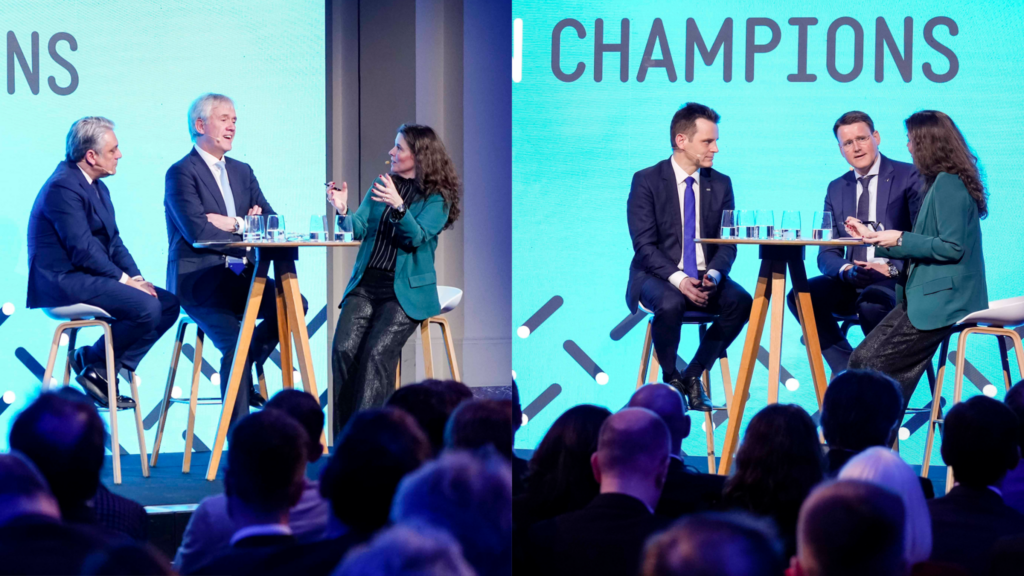Europe’s Auto Industry: Collaboration Key to Staying Ahead in Electric Vehicle Race (ACEA)

|
Listen to this story:
|
To build a resilient e-mobility ecosystem, European automotive, tech, and power champions must cooperate more closely. This was the message from leading CEOs during the European Automobile Manufacturers’ Association’s (ACEA) #FutureDriven Reception in Brussels last night.
“The European auto industry is facing one of its most disruptive transformations as it navigates the energy transition and digital revolution. This paradigm shift opens the door to new players, new materials and new value chains. But it is not a solo game and cannot happen overnight,” stated Sigrid de Vries, ACEA Director General, welcoming 280 guests from policy and industry circles. “Greater cooperation across the e-mobility ecosystem – built on a real ‘team sport’ spirit – is essential if Europe wants to stay in the race.”
The future of strategic European industries is under serious strain as other global players like the US and China step up their game. Given the crucial role of the tech and power sectors in the auto industry’s green and digital transition, ACEA invited leaders from these sectors to its reception to boost cross-sectoral collaboration at this critical crossroads.
Representing one of Europe’s electric vehicle trailblazers, Luca de Meo, ACEA President and CEO of Renault Group, noted, “There are two things that Europe needs to focus on in our industry: electrification of the powertrain and software-defined vehicles. As the next generation of our products, software-defined vehicles are even more relevant than the powertrain as they can really make a difference for consumers. We need the powertrain to reduce emissions, but the change in experience comes from the software. But to achieve this, we need to work hand-in-hand with our European digital champions.”
Peter Wennink, President and CEO of ASML, a world-leading supplier to the semiconductor industry, warned that Europe is at risk of falling behind if it does not change its approach “The task in Europe is to stay relevant and keep a seat at the table. To do that, we need much more focus on innovation, and big societal challenges need a different approach. Europe needs an architect with a systemic approach to problems. Regulation can help in linking the right players – but the right kind of regulation.”
Alexander Vlaskamp, CEO of MAN Truck & Bus, a European pioneer in electric bus and truck manufacturing, noted, “Europe’s truck industry wants to go green and meet decarbonisation targets, but we need the right grids, the right connections, and the right green hydrogen. In Europe, we have regulations, but there is no stick in the ground for member states to drive implementation. If Europe fails to act today, we are not only lost in Europe, but we are lost when it comes to our global position.”
Leonhard Birnbaum, CEO of E.ON and Eurelectric President, representing the European electricity industry, echoed Vlaskamp’s concerns: “We as an industry need to be fully committed, but we need political support that is fully committed to make us successful. Where is the support for national implementation and coordination? We need more focus on grid infrastructure, and the EU has not put forward a grid action plan. Under the next Commission, we should jointly tackle these bottlenecks so we are in front of the wave and not behind the wave. Being behind the wave is costly, not just for us but also for society.”
Related Article: USPS Unveils First Postal Electric Vehicle Charging Stations and Electric Delivery Vehicles
Concluding the evening, ACEA’s Director General Sigrid de Vries added: “Decisions made in the coming months will determine if Europe will be a leader or laggard in electric vehicle manufacturing. Europe urgently needs a cohesive regulatory framework – not piecemeal regulations – to allow its strategic industries to thrive in the face of growing international competition.”






